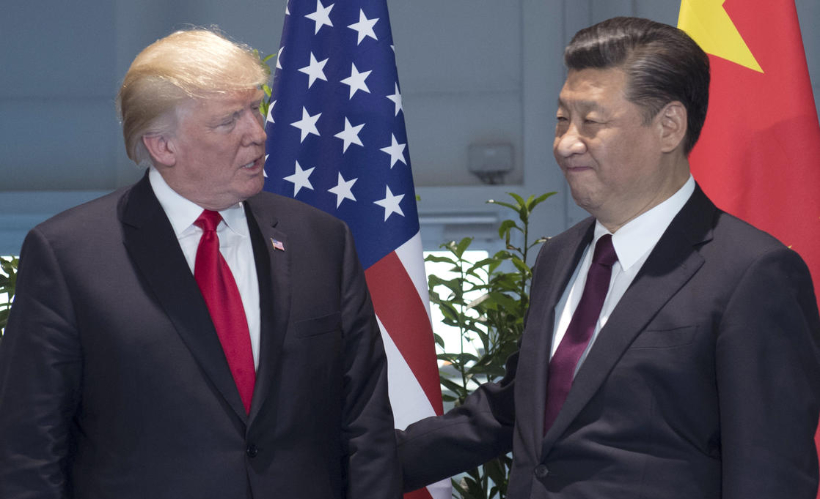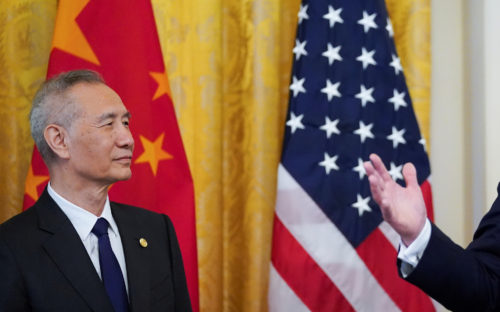Trade war, day 76: Who will win as the Chinese and American economies ‘divorce’?

In less than five days, the scope of the U.S.-China trade war is set to more than triple, from $100 billion in goods tariffed to $360 billion. Both sides continue to dig in to their trenches:
- “Talk is cheap and actions are what matter,” Todd Rokita, a Republican congressman from Indiana said at the World Economic Forum in Tianjin, China, expressing a sense of grievance against Chinese economic policy that is by no means limited to one political party in the U.S.
- Rokita was responding to a speech by Premier Li Keqiang in which he “reiterated promises to lower tariffs and improve the business environment for foreign companies,” the Wall Street Journal reports (paywall).
- “We’ve heard this before,” Wendy Cutler, a former negotiator at the U.S. Trade Representative said separately, adding, “all the buzzwords were there but now the administration is looking for details, not just a general statement.”
- “China will dig in its heels over US tariff pressure,” the Financial Times writes (paywall), pointing out that President Xi Jinping “could well benefit politically from attacks by an external enemy at a time when he faces mounting internal problems,” and that “the biggest impact from the tariffs will be felt by foreign and privately owned companies, not state-owned enterprises.”
- The American Chamber of Commerce in China also expects China to stand firm: “Contrary to views in Washington, China can – and will – dig its heels in and we are not optimistic about the prospect for a resolution in the short term.”
In the last month, as tensions ramped up and negotiations sputtered out, predictions that the Chinese and American economies are headed for disengagement have become more common. “Divorce” is the term being adopted by Bloomberg, as it published a “roadmap for the great U.S.-China divorce” by economist Christopher Balding on September 16, and today reported this: “U.S.-China trade war spells divorce of world’s biggest economies.”
Many more pieces like this one will be publishing in the coming months, as the world grapples with the likely effects of the continuing trade war. Bloomberg reports:
- Vietnam, Thailand, India, and Mexico may “win” from the U.S.-China economic decoupling, according to Michael Every, head of Asia financial markets research at Rabobank in Hong Kong.
- “The U.S. will win geo-strategically by hollowing out China as it has been hollowed out, preventing the Made in China 2025 plan and fracturing the world into a China and U.S. camp with more limited economic connections. It’s a win for U.S. power,” Every added.
- “A moderate trade conflict has no winner; in a serious one, the U.S. loses far less,” Derek Scissors, chief economist at the China Beige Book, clarified, because “there are more substitutes for Chinese supply than American demand.”
- “One goal of U.S. officials is to use tariffs to incentivize U.S. firms to pull their supply chains outside of China, though this isn’t a uniform view within the administration,” Michael Hirson, Asia director at Eurasia Group, said, adding that “the ideal would be to bring production back to the U.S.”
- But the trade war “will not result in bringing more business back to American soil: Just 6% of our member companies say this current US-China trade dispute would make them consider relocating operations back home,” William Zarit, Chairman of American Chamber of Commerce in China said in a statement.
- Another winner: Japan, which is seeing rapidly warming relations with China as a result of the trade war, the SCMP reports, as the two countries are talking about cooperating on the Eastern Economic Corridor in Thailand, and “Chinese officials [have] become more open than in the past to discussing transparency, openness, economic viability and fiscal sustainability” regarding Belt and Road projects.
- American soy farmers may lose big, Reuters says, because there is “a growing confidence within China’s soybean industry and government that the world’s largest pork-producing nation can wean itself off U.S. soy exports.”
- “Cutting the soy ration for hogs from the typical 20 percent to 12 percent would equate to a demand reduction of up to 27 million tonnes of soybeans per year – an amount equal to 82 percent of Chinese soy imports from the United States last year. Chinese farmers could cut soymeal rations by nearly half without harming hogs’ growth, experts and academics said.”
More trade war and related news:
- Is “Cold War” the right term?
Trump has put the U.S. and China on the cusp of a new Cold War / NYT (paywall)
Damien Ma on Twitter: “And here it is, ‘cold war’ comes out of the sheath:”
Respected China-watcher Bill Bishop comments (paywall), “I am not using the term ‘cold war’ to describe the state of US-China relations. We need something more accurate, the situation is in many ways far more complex than the US-USSR cold war.”
Graham Webster, a specialist in tech policy in China and U.S.-China relations, comments: “We can debate whether a “cold war” is emerging between the U.S. and China, but it’s an unambiguous error of language and analysis to say this is the proper-noun “Cold War.” My view is that “cold war” is a misleading term here, evoking plenty from the past that does not fit (isolated economic blocs, bipolar mutually assured destruction) while overlooking much of what’s important now (Internet, supply chains, easy proliferation of disruptive tech).” - More big-picture analysis
US-China trade war: why Trump’s radical China strategy is failing / Vox - More rhetoric about reform
Ex-PBOC chief says China must address its “loopholes” / Reuters via Channel NewsAsia - Why Wilbur Ross is wrong
China still has “bullets” to fight Trump’s trade war / CBS
From yesterday: Wilbur Ross: China ‘out of bullets’ to retaliate to new Trump tariffs / CNBC - Media narrative control
“Nothing on the trade war on the front page of the People’s Daily, just Xi shaking hands with foreign friends” / Eva Dou (@evadou) via Twitter - Leadership of Xi Jinping
Xi reasserts control over PRC politics as trade war deepens / Jamestown Foundation
Willy Wo-Lap Lam writes: “Since returning to Beijing on August 16 after two weeks of informal meetings at the seaside Beidaihe resort, however, Xi has restored enough authority to reassert his ultra-conservative line on socialist-style economic policy, imposing ideological conformity within the Chinese Communist Party (CCP) and challenging America’s position as the pre-eminent world leader.” - How tariffs are seen by American voters
Republicans opposing Trump on trade face election quandary / NYT (paywall)
“Many party leaders in Washington like tax cuts but dislike tariffs. Few Americans share that combination of views.” - Opposition to tariffs
US business groups rail against Trump’s China tariffs / FT (paywall)
“‘As thousands of businesses have testified and explained in comments to the administration, tariffs are a tax on American families,’ National Retail Federation president Matthew Shay lamented.”
“Gary Shapiro, president of the Consumer Technology Association, said… ‘Congress has not given the president or the [US trade representative] a blank check to pursue a trade war.’”
Rising US-China trade tensions ‘couldn’t come at a worse time’: Iowa agriculture secretary / CNBC
Previously in The China Project’s trade war coverage:
Trade war, day 75: Trump’s $200 billion to be met with $60 billion retaliation from China






